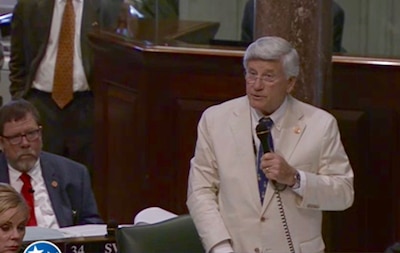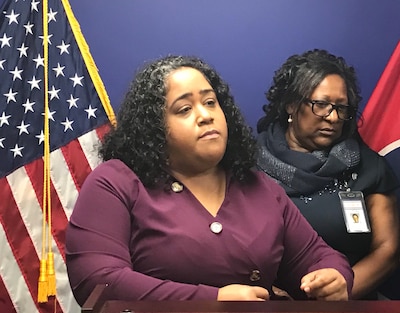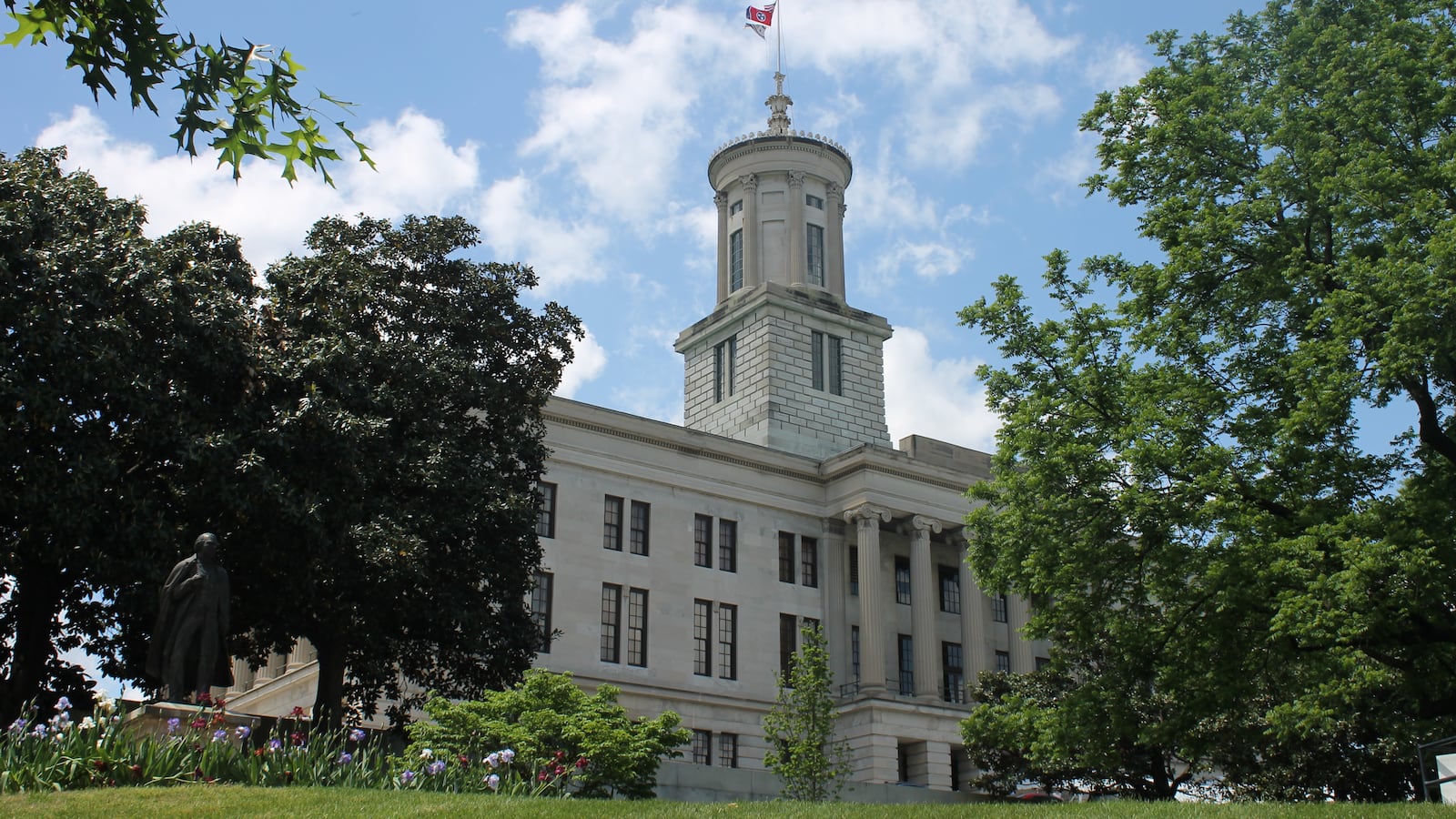Tennessee’s General Assembly passed a compromise education voucher bill on Wednesday targeting only students and districts in Tennessee’s two largest cities and potentially costing $40 million more than was originally announced.

The votes came in the final week of the legislative session and just hours after a conference committee approved the compromise, which also removed homeschoolers from being able to participate in the program.
The passage delivers a major victory to Republican Gov. Bill Lee, who wants Tennessee to start giving taxpayer money to eligible families to pay for private school tuition or related education services. It’s also a win for President Donald Trump and his education secretary, Betsy DeVos, who tweeted their support of Lee’s initiative last week and have urged other states to follow suit.
“This is an important day and I look forward to signing this bill into law,” said Lee, who pledged during his campaign to give parents more education choices for their children, especially those attending low-performing schools.
The program would start by 2021 with up to 5,000 students from Shelby County Schools, Metropolitan Nashville Public Schools, and the state-run Achievement School District. It would cap eventually with 15,000 students and could cost taxpayers $165 million by 2024, according to a new fiscal analysis released on Wednesday. The initial price tag was $125 million over three years.
During debate, House members focused on the bill’s constitutionality before approving it 51-46, while the Senate zeroed in on the program’s cost before passing it 19-14.
The increased fiscal note surprised senators and prompted sponsors to ask for a delay to review the numbers. Later, Democrats who oppose the bill pounded on that theme.
“We are making a commitment to fund a lot more than we have contemplated here,” said Senate Minority Leader Jeff Yarbro of Nashville.
“Whatever we want to call it, this is a new entitlement program,” added Sen. Richard Briggs, a Knoxville Republican. “Once an entitlement program is started, they’re almost impossible to stop.”
But Majority Leader Jack Johnson, the Senate sponsor, said public education is already an entitlement program that is failing some of Tennessee’s children. He said the potential cost is small compared to the state’s $6.5 billion yearly budget for public education.
“Members, this is a good bill. It’s time to try it,” said Johnson, whose mostly affluent Williamson County district would not be affected.
Seeking consensus
The compromise reconciled major differences between bills passed last week in historic votes in both chambers, which had never before jointly approved voucher legislation after more than a decade of attempts.
It provides funding for rural schools that originally was to be set aside exclusively for districts affected by the voucher program. It also requires participating students to take annual state tests in math and English language arts — but fewer than half of the assessments required of their counterparts in public schools.
In addition, the bill changes House language aimed at verifying the legal status of applicants but includes a provision that still seeks to exclude immigrant students from participating.

That intent led Sen. Todd Gardenhire to change his vote to a “no,” even though the Chattanooga Republican has sponsored and supported voucher proposals for years.
“Whether you like it or not, these children are here,” Gardenhire said. “I would rather educate these children, get them a job, let them pay taxes. … When we purposefully structure a bill that’s designed to exclude a segment of our population, we are making a big mistake for the future.”
The House cut off debate just an hour after Rep. Bill Dunn presented the compromise but not before Rep. Karen Camper, a Democrat from Memphis, complained about a lack of transparency on “one of the most important bills this year.”
“It was drafted, probably circulated among other members on the other side and the minority voice was not heard, yet again,” she said, noting that the two Democrats on the 10-member conference committee received the 24-page compromise just as the meeting was convened.
Other Democrats questioned the bill’s constitutionality by limiting its application to Memphis and Nashville when districts in other communities are also home to low-performing schools.
“This thing is going to be declared unconstitutional and then it’s going to be given statewide application and every single person in this state is going to have this bill … apply in their communities,” said Rep. Mike Stewart, a Nashville attorney.
Dunn said the language was thoroughly vetted and dismissed Stewart’s comments as a scare tactic to kill the bill.

Earlier on Wednesday, the conference committee approved the compromise within 30 minutes of convening, even as most of the members were still reviewing the proposal presented by Sen. Brian Kelsey, a Republican from Germantown.
Sen. Raumesh Akbari, a Democrat whose Memphis district would be affected by the new plan, was the sole member to vote against it.
“I was disappointed we were not given an opportunity to read the full report,” Akbari told Chalkbeat at the close of the meeting. “It’s 24 pages long. I consider myself a fast reader and had only made it to page 13 by the end of committee meeting.”
Constitutional questions
Language intended to exclude undocumented students was viewed as critical to gaining support from House members concerned about creating a government program that could benefit people without legal authorization to be in the country. But it also could land the state in court because of a 1982 U.S. Supreme Court ruling that requires states to offer public education to all children, regardless of their immigration status.
District leaders in Memphis and Nashville have threatened to sue the state as well over the constitutionality of any new law that targets their schools and students without including other districts that are also home to low-performing schools.
The final bill includes several provisions aimed at addressing potential litigation or court rulings.
A “severability clause” seeks to keep any new law from being applied to districts statewide if any part of it is struck down.
Other language says a school board “does not have authority to assert a cause of action, intervene in any cause of action, or provide funding for any cause of action challenging the legality of this part.”
The bill also states that Tennessee has a “legitimate interest” in improving the performance of all districts and particularly those that “have consistently had the lowest performing schools on a historical basis.”
For and against
Groups that have fought both for and against vouchers quickly acknowledged that Wednesday’s votes were historic and open the door to a major new education program in Tennessee.
“Tennessee will be empowering thousands of lower-income and working-class families with the freedom to choose and customize the education that fits their children’s needs,” said Lee Barfield, a Nashville attorney and board member of the pro-voucher American Federation for Children, which lobbied heavily for the bill.
Leaders of a statewide coalition of more than 50 civil rights and advocacy groups said they want to be part of discussions as the new program, dubbed the Tennessee Education Savings Account, is developed.
“Now that the ESA bill has passed, we will focus on its implementation, pressing for strong accountability and public reporting so that families know if vouchers are benefiting students in Tennessee,” said Gini Pupo-Walker in behalf of the Tennessee Educational Equity Coalition, which had opposed the governor’s plan.
The head of one professional educators group said public school teachers will still do their jobs while the upcoming voucher law likely will be challenged in court.
“Public education still provides the best opportunity for most children to obtain that success. We do not envision this limited pilot program changing that fact,” said JC Bowman, executive director of Professional Educators of Tennessee.
Groups representing the state’s immigrant communities said the fight against the governor’s plan is not over.
“While the legislature failed to defend the rights of immigrant families, we expect the courts to overturn the discriminatory provisions of this bill and uphold the right of all children to equal access to education,” said Lisa Sherman-Nikolaus, policy director at Tennessee Immigrant & Refugee Rights Coalition.
This story has been updated with costs from a revised fiscal note. You can read the final bill below:

